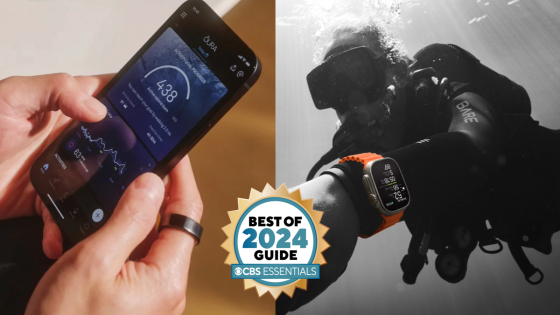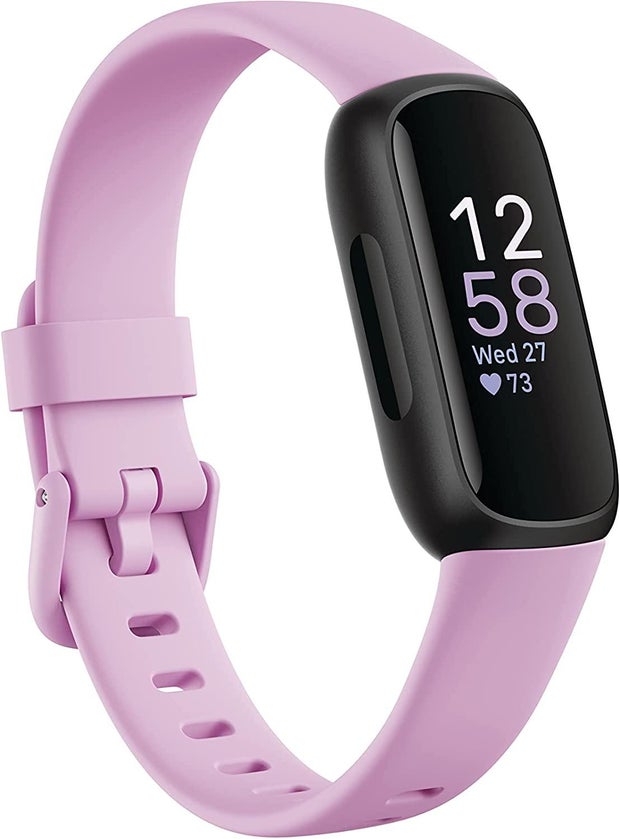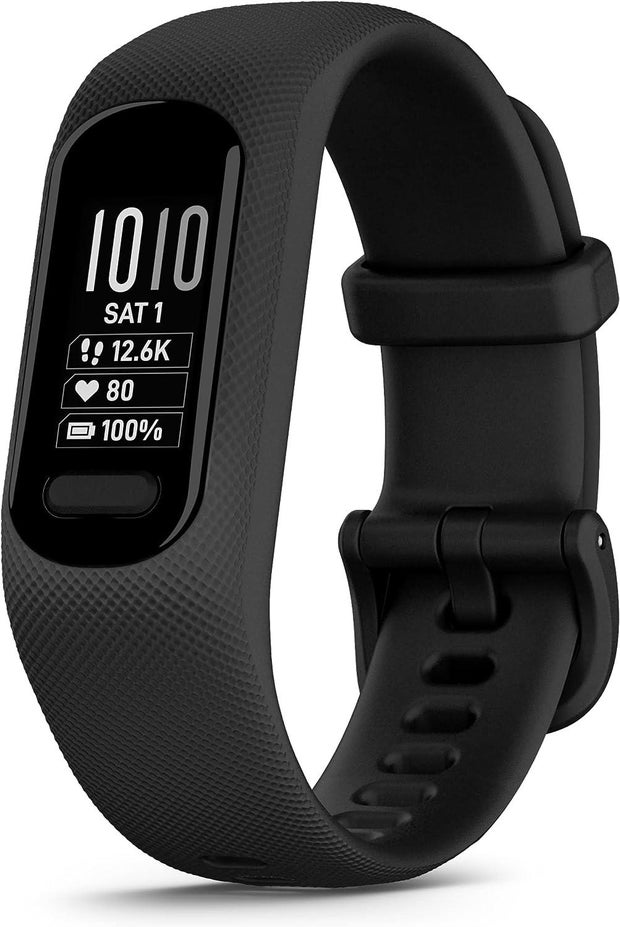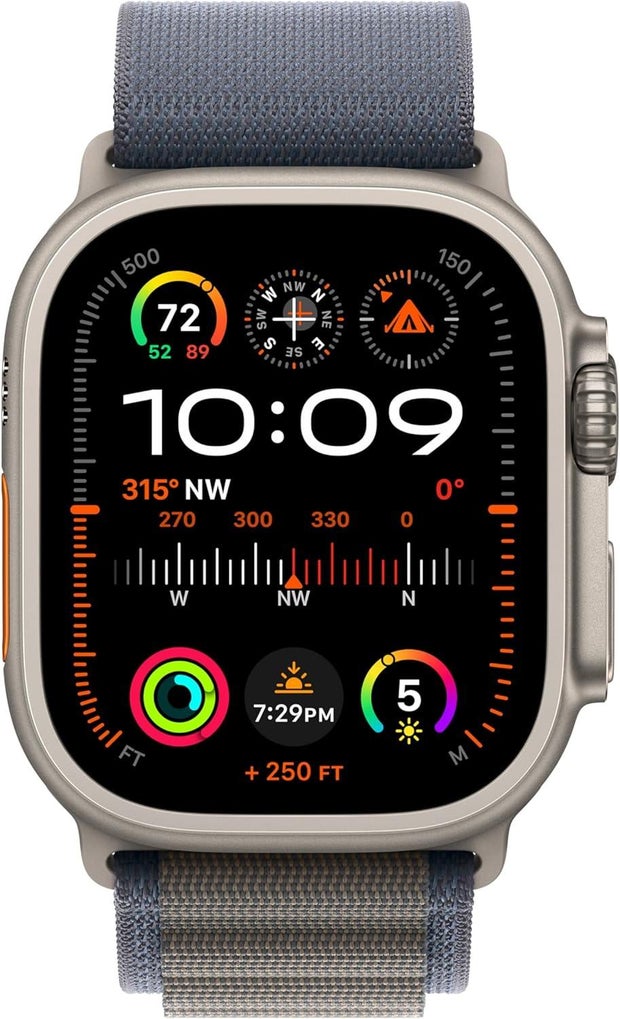Oura, Apple
The line between fitness tracker and smartwatch has certainly blurred, but one difference stands out: Price. Fitness trackers are often less expensive than a full featured smartwatch. They also tend to focus more on health, fitness, sleep and activity tracking.
Fitbit (which is now owned by Google) offers some of the most popular fitness trackers, but as you’re about to discover, other companies, like Garmin and Oura, also offer powerful and versatile fitness tracking options — models that do so much more than just count your steps.
If you’d rather spend a bit more on a smartwatch and get more functionality, be sure to read our coverage of the five best smartwatches for 2024. And keep in mind, in addition to staying active, a proper diet is necessary to stay physically fit. To make meal planning a bit easier, we suggest a meal kit that caters to weight loss and fitness-friendly eating. And don’t forget to stay hydrated. For this, we suggest having a filled, self-cleaning water bottle with you whenever you’re working out.
What is the best fitness tracker?
Whether you want to track your steps, monitor your workouts, or measure your heart rate and calories burned during a workout, a fitness tracker comes in handy. These wearable devices can also guide you through a training session, track your sleeping patterns and monitor your stress level.
Our team of in-house consumer tech experts has curated this roundup of the best fitness trackers, smartwatches with fitness tracking capabilities, and other health/fitness-related wearables. Even if you’re not tech-savvy, one of these devices can help you better understand, measure and track your health, fitness and sleep-related activities — all in conjunction with your smartphone.
Best fitness tracker overall: Fitbit Sense 2
Fitbit
Designed to be worn snugly around your wrist, the Fitbit Sense 2 offers a robust selection of onboard sensors for tracking things like your heart rate, SpO2 level, ECG, stress level and sleep. It also keeps track of your location, so it can measure things like distance and speed traveled.
This fitness tracker is waterproof (so you can wear it while swimming). It features a full-color touchscreen and includes more than 40 exercise modes. Pair the Sense 2 with either an iPhone or Android phone and use it in conjunction with the free Fitbit app and subscription Fitbit Premium service. (The Sense 2 comes with a six-month trial membership.)
Battery life is up to six days per charge. And while it’s not designed to be a full-featured smartwatch (although it looks like one), it displays incoming text messages, phone alerts and certain app-specific information. Plus, it works with Fitbit Pay and Google Pay, as well as Google Maps and Apple Maps.
Best budget fitness tracker: Fitbit Inspire 3
Fitbit
The Fitbit Inspire 3 is smaller and more streamlined than the Sense 2. Battery life is up to 10 days. Like all Fitbit devices, this one handles things like step counting, calculating distance traveled and monitoring calories burned throughout the day and during specific workouts. It also measures your heart rate and SpO2 level, plus it tracks your sleep patterns and stress level.
Since it pairs with either an iPhone or Android phone, it’ll display call, text and app notifications. Oh, and it tells the time, too.
The Inspire 3 features a three-inch long display. The device itself comes in three color options. In addition to tracking your movement and activities throughout the day and night, it has more than 20 exercise modes.
Inspire 3 works in conjunction with the free Fitbit smartphone app, but can also be used with the subscription-based Fitbit Premium service. (The Inspire 3 comes with a six-month trial membership to this service.)
Best fitness tracker in a ring: Oura Horizon (Generation 3)
Oura
Samsung recently released plans to introduce a fitness tracking ring, and Apple is rumored to be working on a similar device. In the meantime, Oura smart rings keep on improving with each new firmware and app update.
The third generation of the Oura ring comes in a wide range of colors and unisex styles. It’s designed to be worn 24/7 and has an internal rechargeable battery that lasts up to a week. The ring tracks heart rate, stress level, body temperature, activity level and sleep patterns. To get full use out of this fitness tracking ring, you’ll need to use it with a proprietary smartphone app (available for iPhones and Android phones).
For more in-depth data analysis, an Oura membership ($5.99 per month) is recommended, but not required. This collected data can also be shared with the Apple Health, Google Health Connect and more than 40 other popular health and fitness smartphone apps.
The ring itself is made of titanium, so it’s waterproof and durable, yet fashionable. And if you have an HSA or FSA account tied to your health insurance, you can use those funds to pay for the ring. We’ve found the Oura ring to be extremely comfortable to wear. It’s lighter than most other rings. Over time, it can provide a tremendous level of insight related to your overall health, fitness and sleep patterns.
Best Garmin fitness tracker: Vívosmart 5
Amazon
Following in the footsteps of Fitbit, Garmin tapped its GPS and navigation expertise and incorporated it into a compact, comfortable fitness tracker. It works with an iPhone or Android phone and is surprisingly affordable.
The display is just 0.84 inches long, but this wearable tracker serves as a pedometer, heart rate monitor and sleep monitor. It also tracks your daily workouts, calories burned and stress level. Plus, it has an integrated GPS and SpO2 sensor. Of course, it also displays the time and date.
The device comes in four color options. It offers up to a seven day battery life and is waterproof, so you can use it while swimming or showering. This fitness tracker works in conjunction with the free Garmin Connect phone app. However, integrated into the device itself, you’ll discover specialized activity apps for walking, running, yoga, cardio, swimming, cycling and more.
While the Vívosmart 5 is not meant to be a smartwatch, it can handle some basic smartwatch tasks, like displaying notifications for incoming calls, text messages and appointments generated by your phone. A variety of interchangeable bands are sold separately.
Best smartwatch with fitness tracking for iPhone users: Apple Watch Ultra 2
Apple
Let’s be clear: All Apple Watches run the same version of the WatchOS operating system, come with the same apps, pair with the iPhone and offer thousands of optional apps via the Apple Watch’s app store. But it’s the Ultra 2 that’s more rugged, has a brighter display and a longer battery life. It offers the most robust collection of features for an outdoor adventurer or serious athlete, along with — get this — a built-in emergency siren, enhanced GPS and a customizable action button. These are features not offered by other Apple Watch models.
Also, while the Apple Watch Series 9 and Apple Watch SE come in either a GPS only or GPS + cellular version (we recommend the latter), the Ultra 2 only offers a GPS + cellular version. And if you want an incredibly rugged titanium casing, well, that’s reserved for the Ultra 2, too.
Like all Apple Watches, the Ultra 2 works in conjunction with the iPhone’s Health app. It also works with the Apple Fitness+, Apple Music and Apple Podcasts services and offers full smartwatch functionality. So it can make and receive calls and text messages, stream audio, work with Apple Maps for real-time navigation and much more.
Currently, Ultra 2 is the most advanced Apple Watch and one of the most feature-packed smartwatches available — although it’ll appeal mainly to outdoor adventurers and serious athletes. For everyone else, we suggest checking out our full, in-depth review of the Apple Watch Series 9.
Best smartwatch with fitness tracking for Android users: Google Pixel Watch 2
When Google acquired Fitbit, it gathered up all of the fitness tech that Fitbit has pioneered and then packed virtually all of it into the full-featured Google Pixel Watch 2 smartwatch.
So when you wrap a Pixel Watch 2 around your wrist, you’re getting the best of Fitbit fitness, activity and sleep tracking, combined with the full functionality of a smartwatch that can also be used as a powerful communications, productivity, navigational and entertainment tool. It works in conjunction with any Android phone, but uses a very similar interface to the Google Pixel smartphones.
Heart rate tracking, body temperature monitoring, ECG functionality, stress management and sleep tracking are built into the unisex Pixel Watch 2. It also offers emergency features, like fall detection and an Emergency SOS button.
The phone uses a full-color, always-on display. You get up to a 24-hour battery life per charge. It also has built in cellular capabilities (that need to be activated for a monthly fee). This allows the watch to work almost fully autonomously from a smartphone when it comes to calls, texts, streaming audio, GPS navigation and much more.
We love the Pixel Watch 2 because feature-for-feature it offers just about everything that more expensive smartwatches offer, but this one is priced at just $400 (less when it’s on sale). With this watch, you get the best of a Fitbit and a smartwatch in one affordable device.
How to choose the best fitness tracker
First determine what functions you want your fitness tracker to handle. Then determine if you’ll be using it with an Apple iPhone or Android smartphone. Here are some additional things to consider:
- Monitoring features: Some fitness trackers can serve as a personal trainer or tracker while walking, running, swimming, doing yoga, diving, cycling and more. They can also monitor your sleep patterns and stress levels. In addition to heart rate, ECG, body temperature and SpO2 levels, many fitness trackers can monitor distance traveled, calories burned and a wide range of other fitness and health matrices.
- Battery life: This determines how long you can use the device before it needs to be recharged.
- Casing material: Most of the latest casings are made from plastic, aluminum or stainless steel. This impacts price, appearance and durability.
- Casing size: Casing size affects the size of its display and how it’ll look and feel on your wrist. Smaller sizes are designed to be more comfortable and lighter for people with smaller wrists.
- Cellular option: All fitness trackers rely on Bluetooth to communicate with a smartphone. When one of these devices also offers cellular connectivity, it can work almost autonomously from a smartphone. I can make calls, send texts, stream music, access real-time navigation information and more — even when your smartphone is not nearby. To use cellular connectivity, you’ll need a service provider, which charges a monthly fee (usually around $10 per month).
- Emergency features: If you’re investing in a fitness tracker with cellular connectivity, choose one that offers fall detection and crash detection. If you’re involved in an accident and can’t call for help yourself, one of these wearable devices can often contact 9-1-1 and your pre-programmed emergency contacts, plus provide your exact location.
- Integrated sensors: Many of the latest fitness trackers measure things like pulse rate, oxygen saturation, steps taken, respiration rate, sleep patterns, stress level, calories burned, activity level and even hydration level.
- Operating system: Some fitness trackers, like those from Fitbit and Garmin, use an operating system compatible with both iPhones and Android smartphones.
- Watchband selection: All fitness trackers come with one watchband. Most also have a selection of optional bands available in a variety of colors and styles.
- Water resistance: All fitness trackers are water resistant. But ideally, you want a wearable device that’s waterproof, so it can be worn in a shower or while swimming, snorkeling or even scuba diving.
What’s the difference between a fitness tracker and smartwatch?
These days, there’s a lot of overlap in terms of functionality. A fitness tracker tends to focus more on collecting fitness, activity, health, sleep and stress-related data, but might also offer basic smartwatch functionality. A full-featured smartwatch, however, can perform all of the tasks of a fitness tracker, but also run all sorts of communications, entertainment, productivity, navigation and other types of apps. When you add GPS and cellular connectivity, this makes a smartwatch a powerful tool.
Do fitness trackers work with any iPhone or Android smartphone?
Apple Watches are designed to work exclusively with an iPhone. The Google Pixel 2 smartwatch is only designed for use with an Android smartphone. However, all Fitbit and Garmin fitness trackers, along with the Oura ring, can be used with either an iPhone or Android phone in conjunction with a proprietary app on your phone.
Do fitness trackers work with exercise equipment?
All fitness trackers are designed to track your movement and exercise. Some have workout modes designed for use with an exercise bike, elliptical machine or another piece of gym equipment.
To learn all about the latest consumer tech, read in-depth product reviews, discover informative buyer’s guides for popular products and find the best deals, be sure to check out our constantly updated tech coverage.
Source Agencies










